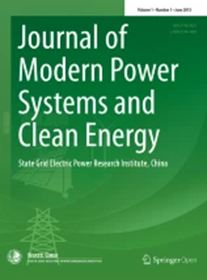State Transition Modeling Method for Optimal Dispatching for Integrated Energy System Based on Cyber—Physical System
IF 5.7
1区 工程技术
Q1 ENGINEERING, ELECTRICAL & ELECTRONIC
Journal of Modern Power Systems and Clean Energy
Pub Date : 2024-03-29
DOI:10.35833/MPCE.2024.000090
引用次数: 0
Abstract
The traditional energy hub based model has difficulties in clearly describing the state transition and transition conditions of the energy unit in the integrated energy system (IES). Therefore, this study proposes a state transition modeling method for an IES based on a cyber-physical system (CPS) to optimize the state transition of energy unit in the IES. This method uses the physical, integration, and optimization layers as a three-layer modeling framework. The physical layer is used to describe the physical models of energy units in the IES. In the integration layer, the information flow is integrated into the physical model of energy unit in the IES to establish the state transition model, and the transition conditions between different states of the energy unit are given. The optimization layer aims to minimize the operating cost of the IES and enables the operating state of energy units to be transferred to the target state. Numerical simulations show that, compared with the traditional modeling method, the state transition modeling method based on CPS achieves the observability of the operating state of the energy unit and its state transition in the dispatching cycle, which obtains an optimal state of the energy unit and further reduces the system operating costs.基于网络-物理系统的综合能源系统优化调度状态转换建模方法
传统的基于能源中枢的模型难以清晰描述综合能源系统(IES)中能量单元的状态转换和转换条件。因此,本研究提出了一种基于网络物理系统(CPS)的综合能源系统状态转换建模方法,以优化综合能源系统中能源单元的状态转换。该方法将物理层、集成层和优化层作为三层建模框架。物理层用于描述 IES 中能源单元的物理模型。在集成层,将信息流集成到 IES 中的能源单元物理模型中,建立状态转换模型,并给出能源单元不同状态之间的转换条件。优化层的目标是使 IES 的运行成本最小化,并使能量单元的运行状态转移到目标状态。数值模拟表明,与传统建模方法相比,基于 CPS 的状态转换建模方法实现了调度周期内能量单元运行状态及其状态转换的可观测性,从而获得了能量单元的最优状态,进一步降低了系统运行成本。
本文章由计算机程序翻译,如有差异,请以英文原文为准。
求助全文
约1分钟内获得全文
求助全文
来源期刊

Journal of Modern Power Systems and Clean Energy
ENGINEERING, ELECTRICAL & ELECTRONIC-
CiteScore
12.30
自引率
14.30%
发文量
97
审稿时长
13 weeks
期刊介绍:
Journal of Modern Power Systems and Clean Energy (MPCE), commencing from June, 2013, is a newly established, peer-reviewed and quarterly published journal in English. It is the first international power engineering journal originated in mainland China. MPCE publishes original papers, short letters and review articles in the field of modern power systems with focus on smart grid technology and renewable energy integration, etc.
 求助内容:
求助内容: 应助结果提醒方式:
应助结果提醒方式:


